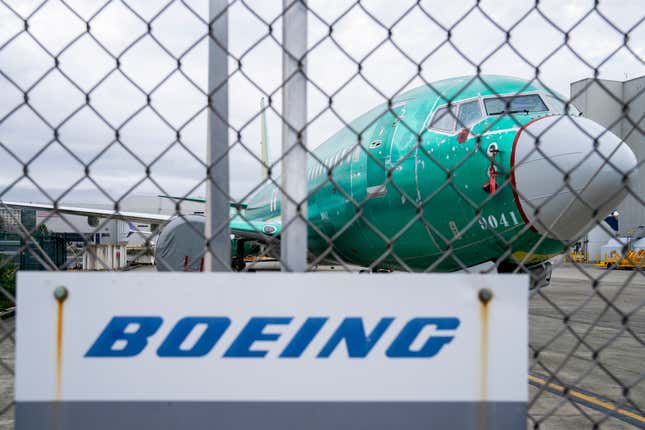
In This Story
Boeing (BA-0.01%) suffered a major legal setback Thursday when a federal judge struck down the plea agreement that the company had hoped would bring a major piece of litigation to a close.
Judge Reed O’Connor of the Northern District of Texas rejected the plea deal Boeing had struck in the wake of fatal plane crashes in 2018 and 2019 because the agreement would be too deferential to Boeing and includes too many diversity-equity-and-inclusion considerations.
“The plea agreement requires the parties to consider race when hiring the independent monitor,” O’Connor wrote in his order striking down the deal. “Additionally, the plea agreement marginalizes the Court in the selection and monitoring of the independent monitor. These provisions are inappropriate and against the public interest.”
Boeing did not immediately respond to a Quartz request for comment.
The federal government settled a criminal fraud investigation into Boeing in 2021 after the fatal crashes of 737 Max 8 planes operated by Ethiopian Airlines and the Indonesian carrier Lion Air, which were caused in part by miscommunications about a pilot safety system equipped on both flights.
When a door plug fell off a 737 Max 9 mid-flight in January, the Justice Department alleged that Boeing’s inability to rectify its safety and quality-control practices violated that settlement. In July, Boeing pleaded guilty in a new settlement to fraud charges that had been deferred as part of its prior agreement. That deal is the one that O’Connor has struck down.
Part of the reasoning for the rejection is that it doesn’t have strong enough measures to ensure compliance with federal monitoring that would accompany it.
“The plea agreement provides that the retention of an independent compliance monitor is a special condition of probation, meaning if Boeing fails to retain the monitor, it will violate its probation,” O’Connor wrote. “But the plea agreement prohibits imposing as a condition of probation a requirement for Boeing to comply with the monitor’s anti-fraud recommendations.”
Another part of the agreement that O’Connor disagreed with was the requirement to consider diversity and inclusion in the selection of the federal monitor. The judge spent more than half his order discussing the federal government’s and Boeing’s commitments to racial equity, specifically calling out Boeing’s goal of hiring more Black people.
“While the Government assures the Court that the Government will consider all possible monitors (i.e., all backgrounds, etc.) but will choose a monitor solely based on merit and talent, the Court is skeptical of this assertion,” he writes.
O’Connor, who was appointed to the judiciary by George W. Bush in 2007, is a judge often favored by litigants seeking conservative rulings. He made headlines earlier this year because he had to recuse himself from a lawsuit filed by Elon Musk against advertisers on his X social media platform when it was discovered that he owned significant amounts of Tesla (TSLA-3.33%) stock, where Musk is CEO.